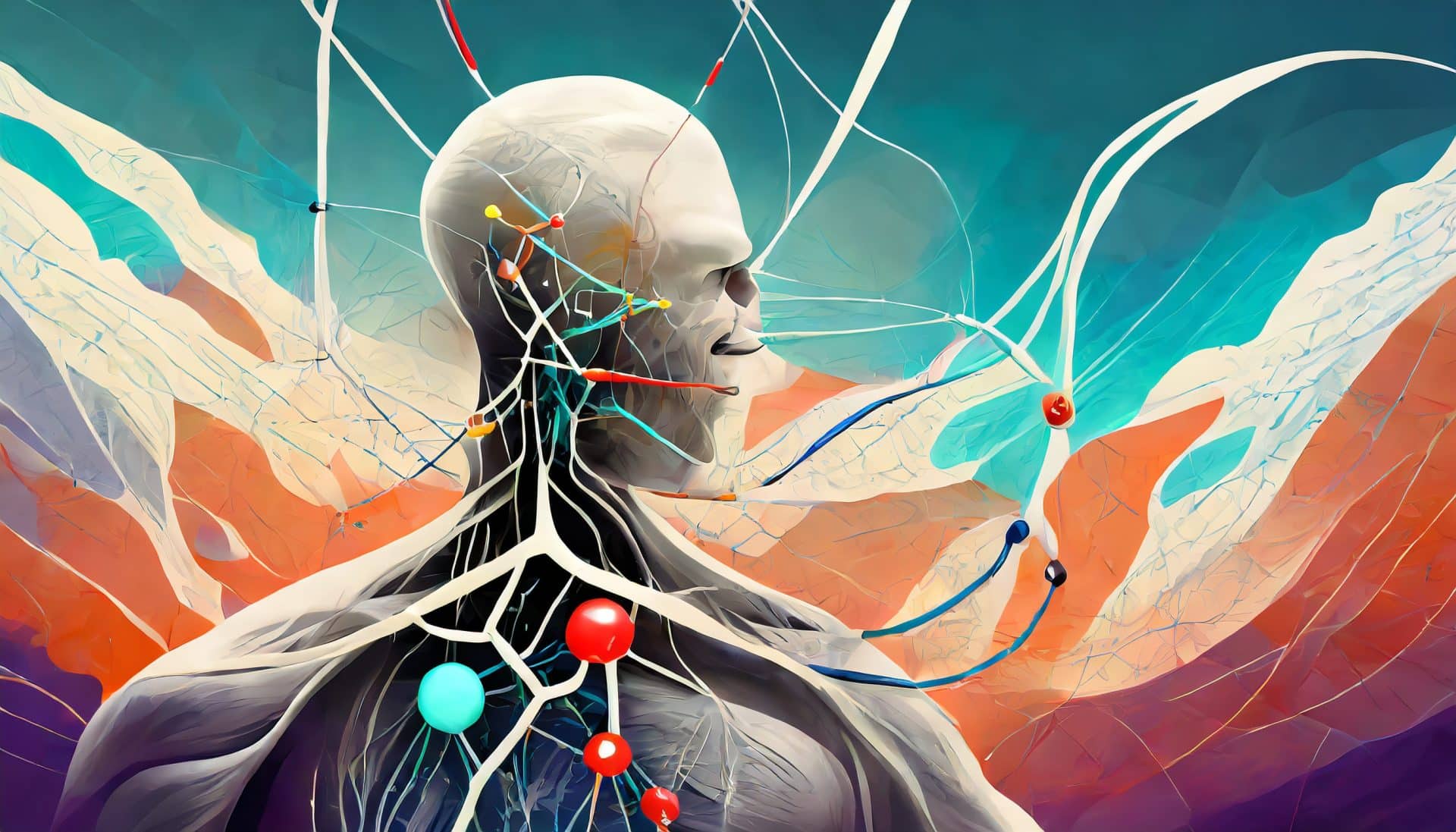Happiness is when what you think, what you say, and what you do are in harmony.
Mahatma Gandhi.
What are ‘The Happy Hormones’?
The Happy Hormones, scientifically described as neurotransmitters, perform some genuinely remarkable roles in our brains and bodies:
- Dopamine: Known as the ‘reward chemical’, dopamine links our actions to pleasure or satisfaction, giving us joy when we accomplish goals. It is an integral part of the brain’s reward system, underpinning our motivation and focus.
- Serotonin: Frequently called the ‘feel good hormone’, Serotonin regulates our moods, sleep, appetite, digestion, learning ability, and memory. It is perceived as a natural mood stabiliser, encouraging overall well-being and happiness.
- Oxytocin: Prominently known as the ‘love hormone’, Oxytocin sparks feelings of trust, affection, and bonding. It strengthens relationships and induces feelings of peace, calm, and security.
In the following sections, we’ll explore these hormones, their functions and differences, and give tips to optimise their levels for a happier, healthier life.

Understanding the Role of the ‘Do’ Drug – Dopamine in Our Body
Dopamine is undeniably an astonishing substance, vitally necessary for us to move, think, and feel in a variety of ways. It’s regularly represented as the chemical in our brains that drives our pursuit of reward, but it’s much more comprehensive than that.
In essence, dopamine is a neurotransmitter that aids communication across the bridge that separates our neurons, known as the synapse. Its function, in this case, is crucial. When the sending neuron releases dopamine, it binds to special receptors on the receiving neuron, sending a signal across the synapse.
The Function of Dopamine in Our Body
Where in our bodies dopamine acts can significantly affect its ultimate function. In the nervous system, dopamine plays a crucial role in regulating movement—a fact that was made more evident when it was discovered that dopamine deficiencies are one underlying cause of Parkinson’s disease.
Motion: Dopamine helps control our motor functions and coordination. With enough dopamine, our movements might become faster and more coordinated.
Mood and motivation: In the brain, especially in regions like the ventral striatum and frontal cortex, dopamine is critical for mood regulation and motivation. It can boost drive, focus, and productivity.
Memory and learning: Additionally, dopamine plays a significant role in memory and learning, with high levels associated with enhanced memory and attention.
Dopamine: The Reward System
One of the most prominent roles of dopamine is its part in the ‘reward system’ of the brain. When you do something satisfying—say, biting into a delicious juicy burger, doing a great workout, or experiencing a special moment with a loved one—your brain releases dopamine. This surge in dopamine gives you a feeling of pleasure and reward, which makes you want to repeat the same action in the future.
Understanding how dopamine affects our bodies and minds can provide us with tools to improve our well-being and productivity. However, it’s crucial to remember that maintaining balance is the key. Too much dopamine can result in impulsivity and high-risk behaviours. At the same time, too little can cause mood disorders and negative symptoms like low motivation and anhedonia (the inability to feel pleasure).
Ultimately, optimising dopamine levels isn’t about chasing quick hits of instant gratification. Instead, it’s about nurturing a balanced, healthy lifestyle incorporating good nutrition, exercise, stress management, and positive relationships.

Exploring the Impact of Serotonin on Mood and Behaviour
Serotonin holds its unique and crucial place in the rich tapestry of our brain’s neurochemical activity. Often referred to as the ‘feel good’ hormone, it profoundly impacts our mood, behaviour, and overall well-being.
The Pivotal Role of Serotonin
Serotonin acts as a neurotransmitter, a chemical that helps transmit signals in the brain. Although Serotonin is manufactured in the brain, where it performs its primary functions, only about 10% of the body’s serotonin supply is in the brain.
How does this neurotransmitter affect our mood? When Serotonin is released and floods specific neural pathways, it makes us experience feelings of contentment, calmness, and overall happiness. But the story doesn’t end here. Serotonin is also essential in moderating moods and warding off depression and feelings of anxiety.
Serotonin Deficiency: The Unseen Disorder
Imagine a drop in this crucial hormone. The perceived joy and tranquillity could turn into a gloomy cloud, making individuals prone to mood swings and depressive states. Yes, that’s the power of serotonin deficiency: it can disrupt daily life in imperceptible yet impactful ways. Studies have found direct links between lower serotonin levels and disorders like depression and anxiety.
Ways to Boost Serotonin Production
Fortunately, the good news is that our bodies can naturally increase serotonin levels. Here are a few scientifically backed ways to boost your Serotonin:
- Mindful Eating: Consuming foods, such as eggs, cheese, tofu, nuts, seeds, and salmon, which are rich in tryptophan, an essential amino acid, can assist your body in producing more Serotonin.
- Sunlight Exposure: Serotonin production is linked to daylight and sunlight exposure. Spending time under the sun can be a feel-good exercise with multiple benefits.
- Physical Exercise: Physical activity stimulates serotonin production, making you feel happier and more relaxed. Practising regular exercise is a natural and cost-effective serotonin booster.
- Mindfulness and Meditation: Mind-body practices like yoga and meditation help increase serotonin levels by reducing stress and promoting relaxation.
It’s essential to note that a balanced lifestyle can play a critical role in maintaining healthy serotonin levels, offering a sustained feeling of well-being and joy. So, embrace balance, carry a sunny smile, and keep your Serotonin functioning optimally!

Delving into the Love Hormone: Oxytocin
Popularly known as the “love hormone”, Oxytocin plays a significant role in social bonding and romantic relationships. However, it’s just as vital in several other applications in human physiology, deserving of a robust exploration of its multifaceted functions.
Unravelling the Functions of Oxytocin
Oxytocin, a hormone produced primarily in the hypothalamus, is secreted into the bloodstream by the pituitary gland to take action in various body parts. Its functions are tremendously diverse—from childbirth and lactation to our emotions and behaviour.
- Childbirth and Lactation: Oxytocin’s most well-known functions are related to childbirth. During labour, the hormone assists in uterine contractions; following birth, it helps release milk for breastfeeding.
- Emotions and Social Behaviour: On a psychological level, Oxytocin can amplify feelings of trust, empathy, and bonding. It’s heavily involved in building and strengthening social connections, hence its nickname – the “love hormone”.
- Post-coital snuggles.
Perils of Oxytocin Imbalance
Like Dopamine and Serotonin, an imbalance in Oxytocin levels can have negative impacts on our mental and physical health. A deficiency can lead to difficulties in forming relationships and poor social skills. On the other end of the spectrum, too much Oxytocin can lead to emotional oversensitivity and an increased risk of dependency in relationships. It’s a delicate balance to strike.

Balancing Act: The Interplay Between Dopamine, Serotonin, and Oxytocin
Dopamine, Serotonin, and Oxytocin relationships go beyond simple chemical interactions. When these three ‘Happy Hormones’ are in balance, they can produce a symphony of positive effects on the mind and body. However, when out of balance, the discord can impact mood, decision-making and overall health.
The Dance of the Happy Hormones: Dopamine, Serotonin, and Oxytocin
Dopamine, Serotonin, and Oxytocin are sometimes called ‘The Happy Trinity’. Dopamine primarily motivates us towards goals and provides a sense of accomplishment when we achieve them. Serotonin provides feelings of well-being and happiness, while Oxytocin is often released during physical contact, promoting bonding and love. Together, they create an environment in our bodies that promotes happiness and satisfaction, creating a sense of peace and contentment.
Think of these hormones as a well-coordinated band playing a harmonious tune. Change in one can disrupt the rhythm of the others. Each has its role, and with one, the balance is precise. Life becomes less melody and more cacophony.
Balancing the Happy Hormones: Strategies to Optimise
So how can we optimise this interplay of ‘Happy Hormones’? Here are a few strategies to consider:
- Eat Healthy: Maintain a balanced diet rich in protein, fibre, and healthy fats, which contribute to the production and regulation of these hormones.
- Exercise Regularly: Regular physical activity stimulates the production of all three happy hormones.
- Maintain Strong Relationships: Interacting with loved ones, riding, hugging, and laughing releases these positive hormones, especially Oxytocin.
- Reduce Stress: Chronic stress can deplete these hormones and inhibit their function. Meditation, yoga, and deep-breathing exercises can help reduce stress levels.
- Get Adequate Sleep: Sleep deprivation can disrupt the production and balance of these hormones. Therefore, ensuring that you get enough rest each night is crucial.
- Lots of sexytime.
Understanding the relationship between Dopamine, Serotonin, and Oxytocin is critical to promoting physical and mental well-being. By adopting the strategies above, we can create a favourable environment in our bodies, optimising our ‘Happy Hormones’ and enjoying a more fulfilling and contented life.q

